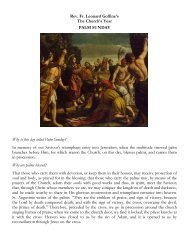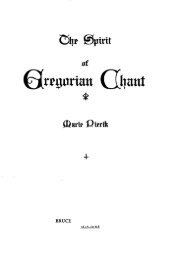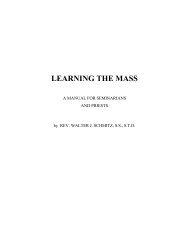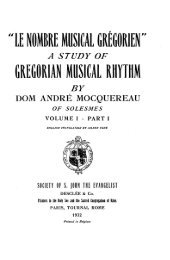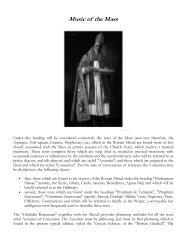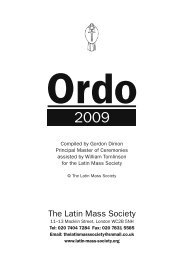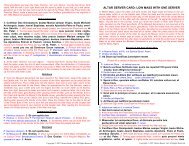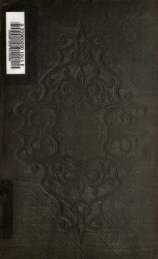- Page 1 and 2: THE CHANTS OF THE VATICAN GRADUAL B
- Page 3 and 4: CONTENTS Foreword by the Translator
- Page 5 and 6: Contents v St. Matthias, Apostle 37
- Page 7 and 8: ACKNOWLEDGMENT The translators grat
- Page 9 and 10: x Foreword to the First German Edit
- Page 11 and 12: BIBLIOGRAPHY Following are some wor
- Page 13 and 14: LITERATURE With Abbreviations Used
- Page 15 and 16: Structure and Expressiveness of the
- Page 17 and 18: 4 Structure and Expressiveness of t
- Page 19 and 20: 6 Structure and Expressiveness of t
- Page 21 and 22: 8 Structure and Expressiveness of t
- Page 23 and 24: 10 Structure and Expressiveness of
- Page 25 and 26: 12 Structure and Expressiveness of
- Page 27 and 28: 14 First Sunday of Advent the cloud
- Page 29 and 30: 16 First Sunday of Advent Obviously
- Page 31 and 32: 18 First Sunday of Advent ag ccbg a
- Page 33 and 34: 20 Second Sunday of Advent Communio
- Page 35 and 36: 22 Second Sunday of Advent manifest
- Page 37: 24 Second Sunday of Advent evident
- Page 41 and 42: 28 Third Sunday of Advent one views
- Page 43 and 44: 30 Third Sunday of Advent ment of t
- Page 45 and 46: 32 Third Sunday of Advent Benedixis
- Page 47 and 48: 34 Fourth Sunday of Advent FOURTH S
- Page 49 and 50: 36 Fourth Sunday of Advent dem Domi
- Page 51 and 52: 38 Fourth Sunday of Advent harsh en
- Page 53 and 54: 40 Fourth Sunday of Advent the Mass
- Page 55 and 56: 42 Vigil of the Nativity below it.
- Page 57 and 58: 44 Vigil of the Nativity today alre
- Page 59 and 60: 46 Christmas Day—Midnight Mass an
- Page 61 and 62: 48 Christmas Day—Midnight Mass I,
- Page 63 and 64: 50 Christmas Day—Third Mass Intro
- Page 65 and 66: 52 Christmas Day—Third Mass Now t
- Page 67 and 68: 54 Christmas Day—Third Mass hest.
- Page 69 and 70: 56 Christmas Day—Third Mass what
- Page 71 and 72: 58 St. Stephen, First Martyr full d
- Page 73 and 74: 60 St. Stephen, First Martyr 1. Vid
- Page 75 and 76: 62 St. John, Apostle and Evangelist
- Page 77 and 78: 64 St. John, Apostle and Evangelist
- Page 79 and 80: 66 The Holy Innocents tians, a word
- Page 81 and 82: 68 The Holy Innocents mini is the o
- Page 83 and 84: 70 Sunday within the Octave of Chri
- Page 85 and 86: 72 Sunday within the Octave of Chri
- Page 87 and 88: 74 The Circumcision of Our Lord THE
- Page 89 and 90:
76 Feast of the Holy Name of Jesus
- Page 91 and 92:
78 Feast of the Holy Name of Jesus
- Page 93 and 94:
80 The Epiphany of Our Lord Jesus C
- Page 95 and 96:
82 The Epiphany of Our Lord Jesus C
- Page 97 and 98:
84 The Epiphany of Our Lord Jesus C
- Page 99 and 100:
86 Feast of the Holy Family %. 1. B
- Page 101 and 102:
88 Second Sunday after Epiphany and
- Page 103 and 104:
90 Second Sunday after Epiphany The
- Page 105 and 106:
92 Second Sunday after Epiphany (Jo
- Page 107 and 108:
94 Second Sunday after Epiphany who
- Page 109 and 110:
96 Second Sunday after Epiphany OFF
- Page 111 and 112:
98 Septuagesima Sunday and Eve when
- Page 113 and 114:
100 Septuagesima Sunday The Tract l
- Page 115 and 116:
102 Sexagesima Sunday finem: 2. qua
- Page 117 and 118:
104 Sexagesima Sunday to that found
- Page 119 and 120:
106 Quinquagesima Sunday The Offert
- Page 121 and 122:
108 Quinquagesima Sunday with me, T
- Page 123 and 124:
110 Quinquagesima Sunday 3. in labi
- Page 125 and 126:
112 Ash Wednesday onum tuarum respi
- Page 127 and 128:
114 Ash Wednesday miserere mei: * q
- Page 129 and 130:
116 Ash Wednesday propter gloriam n
- Page 131 and 132:
118 First Sunday in Lent should ope
- Page 133 and 134:
120 First Sunday in Lent of glorifi
- Page 135 and 136:
122 First Sunday in Lent a) b) c) d
- Page 137 and 138:
124 First Sunday in Lent TRACT (Ps.
- Page 139 and 140:
126 Second Sunday in Lent on the bo
- Page 141 and 142:
128 Second Sunday in Lent The frien
- Page 143 and 144:
130 Third Sunday in Lent We pray to
- Page 145 and 146:
132 Third Sunday in Lent my trust")
- Page 147 and 148:
134 Third Sunday in Lent begins the
- Page 149 and 150:
136 Third Sunday in Lent COMMUNION
- Page 151 and 152:
138 Fourth Sunday in Lent ren, give
- Page 153 and 154:
140 Fourth Sunday in Lent The desir
- Page 155 and 156:
142 Passion Sunday rising melody, h
- Page 157 and 158:
144 Passion Sunday and rounded out.
- Page 159 and 160:
146 Passion Sunday entire piece is:
- Page 161 and 162:
148 Passion Sunday it is repeated o
- Page 163 and 164:
150 . . - . • • Pai m Sunday PA
- Page 165 and 166:
152 Palm Sunday Pueri Hebraeorum ve
- Page 167 and 168:
154 Palm Sunday A. Gloria, laus, et
- Page 169 and 170:
156 Palm Sunday depths (cf. the lum
- Page 171 and 172:
158 Palm Sunday to the fourth mode.
- Page 173 and 174:
160 Palm Sundayrelief. No doubt the
- Page 175 and 176:
162 Maundy Thursday minet vultum su
- Page 177 and 178:
164 Maundy Thursday for the feast o
- Page 179 and 180:
166 Maundy Thursday which were wont
- Page 181 and 182:
168 Good Friday silence. When sorro
- Page 183 and 184:
170 Good Friday ings. He sees, as t
- Page 185 and 186:
172 Good Friday placed upon the una
- Page 187 and 188:
174 Holy Saturday answer: Deo grdti
- Page 189 and 190:
176 Holy Saturday The prescribed ti
- Page 191 and 192:
178 Easter Sunday EASTER SUNDAY INT
- Page 193 and 194:
180 Easter Sunday In the psalm-vers
- Page 195 and 196:
182 Easter Sunday The beginning sho
- Page 197 and 198:
184 Easter Monday (f-c, f-b). But d
- Page 199 and 200:
186 Easter Monday actually closes o
- Page 201 and 202:
188 Low Sunday sacrificial spirit!
- Page 203 and 204:
190 Low Sunday ance of the Risen On
- Page 205 and 206:
192 Second Sunday after Easter At t
- Page 207 and 208:
194 Third Sunday after Easter COMMU
- Page 209 and 210:
196 Third Sunday after Easter Allel
- Page 211 and 212:
198 Fourth Sunday after Easter a fo
- Page 213 and 214:
200 Fourth Sunday after Easter grat
- Page 215 and 216:
202 Fifth Sunday after Easter pheme
- Page 217 and 218:
204 Fifth Sunday after Easter FIRST
- Page 219 and 220:
206 Fifth Sunday after Easter Domin
- Page 221 and 222:
208 Rogation Days INTROIT (Ps. 17:
- Page 223 and 224:
210 Rogation Days today and once a
- Page 225 and 226:
212 The Ascension of Our Lord which
- Page 227 and 228:
214 The Ascenion of Our Lord captiv
- Page 229 and 230:
216 Sunday within the Octave of the
- Page 231 and 232:
218 Sunday within the Octave of the
- Page 233 and 234:
220 Whitsunday The very first word
- Page 235 and 236:
222 Whitsunday and for the glory of
- Page 237 and 238:
224 Whitsunday in the third verse,
- Page 239 and 240:
226 Whitsunday knowledge the great
- Page 241 and 242:
228 Monday in Whitsun Week FIRST AL
- Page 243 and 244:
230 Trinity Sunday In and by Himsel
- Page 245 and 246:
232 Corpus Christi OFFERTORY (Tob.
- Page 247 and 248:
234 Corpus Christi liant. This seco
- Page 249 and 250:
236 Corpus Christi the two a parts.
- Page 251 and 252:
238 Corpus Christi 5a. Thus in fait
- Page 253 and 254:
240 Sunday within the Octave of Cor
- Page 255 and 256:
242 Sunday within the Octave of Cor
- Page 257 and 258:
244 Sunday within the Octave of Cor
- Page 259 and 260:
246 The Most Sacred Heart of Jesus
- Page 261 and 262:
248 The Most Sacred Heart of Jesus
- Page 263 and 264:
250 The Most Sacred Heart of Jesus
- Page 265 and 266:
252 Third Sunday after Pentecost TH
- Page 267 and 268:
254 Third Sunday after Pentecost To
- Page 269 and 270:
256 Fourth Sunday after Pentecost A
- Page 271 and 272:
258 Fourth Sunday after Pentecost S
- Page 273 and 274:
260 Fourth Sunday after Pentecost S
- Page 275 and 276:
262 Fourth Sunday after Pentecost f
- Page 277 and 278:
264 Fifth Sunday after Pentecost pe
- Page 279 and 280:
266 Fifth Sunday after Pentecost me
- Page 281 and 282:
268 Sixth Sunday after Pentecost in
- Page 283 and 284:
270 Seventh Sunday after Pentecost
- Page 285 and 286:
272 Seventh Sunday after Pentecost
- Page 287 and 288:
274 Seventh Sunday after Pentecost
- Page 289 and 290:
276 Eighth Sunday after Pentecost G
- Page 291 and 292:
278 Eighth Sunday after Pentecost t
- Page 293 and 294:
280 Ninth Sunday after Pentecost He
- Page 295 and 296:
282 Ninth Sunday after Pentecost To
- Page 297 and 298:
284 Tenth Sunday after Pentecost wo
- Page 299 and 300:
286 Tenth Sunday after Pentecost In
- Page 301 and 302:
288 Eleventh Sunday after Pentecost
- Page 303 and 304:
290 Eleventh Sunday after Pentecost
- Page 305 and 306:
292 Twelfth Sunday after Pentecost
- Page 307 and 308:
294 Twelfth Sunday after Pentecost
- Page 309 and 310:
296 Twelfth Sunday after Pentecost
- Page 311 and 312:
298 Thirteenth Sunday after Penteco
- Page 313 and 314:
300 Thirteenth Sunday after Penteco
- Page 315 and 316:
302 Thirteenth Sunday after Penteco
- Page 317 and 318:
304 Fourteenth Sunday after Penteco
- Page 319 and 320:
306 Fourteenth Sunday after Penteco
- Page 321 and 322:
308 Fifteenth Sunday after Pentecos
- Page 323 and 324:
310 Fifteenth Sunday after Pentecos
- Page 325 and 326:
312 Sixteenth Sunday after Pentecos
- Page 327 and 328:
314 Sixteenth Sunday after Pentecos
- Page 329 and 330:
316 Sixteenth Sunday after Pentecos
- Page 331 and 332:
318 Seventeenth Sunday after Pentec
- Page 333 and 334:
320 Seventeenth Sunday after Pentec
- Page 335 and 336:
322 Eighteenth Sunday after Penteco
- Page 337 and 338:
324 Eighteenth Sunday after Penteco
- Page 339 and 340:
326 Nineteenth Sunday after Penteco
- Page 341 and 342:
328 Nineteenth Sunday after Penteco
- Page 343 and 344:
330 Nineteenth Sunday after Penteco
- Page 345 and 346:
332 Twentieth Sunday after Pentecos
- Page 347 and 348:
334 Twentieth Sunday after Pentecos
- Page 349 and 350:
336 Twenty-First Sunday after Pente
- Page 351 and 352:
338 Twenty-First Sunday after Pente
- Page 353 and 354:
340 Twenty-First Sunday after Pente
- Page 355 and 356:
342 Twenty-Second Sunday after Pent
- Page 357 and 358:
344 Twenty-Second Sunday after Pent
- Page 359 and 360:
346 Twenty-Third Sunday after Pente
- Page 361 and 362:
348 Twenty-Third Sunday after Pente
- Page 363 and 364:
350 Twenty-Third Sunday after Pente
- Page 365 and 366:
352 Twenty-Third Sunday after Pente
- Page 367 and 368:
354 St. Andrew, Apostle terval of a
- Page 369 and 370:
356 St. Andrew, Apostle The second
- Page 371 and 372:
358 The Immaculate Conception of th
- Page 373 and 374:
360 The Immaculate Conception of th
- Page 375 and 376:
362 St. Thomas, Apostle—Purificat
- Page 377 and 378:
364 Purification of the Blessed Vir
- Page 379 and 380:
366 Purification of the Blessed Vir
- Page 381 and 382:
368 Purification of the Blessed Vir
- Page 383 and 384:
370 St. Matthias, Apostle ceive me
- Page 385 and 386:
372 St. Joseph, Spouse of the Bless
- Page 387 and 388:
374 St. Joseph, Spouse of the Bless
- Page 389 and 390:
376 The Annunciation of the Blessed
- Page 391 and 392:
378 The Annunciation of the Blessed
- Page 393 and 394:
380 The Annunciation of the Blessed
- Page 395 and 396:
382 SS. Philip and James the Younge
- Page 397 and 398:
384 SS. Philip and James the Younge
- Page 399 and 400:
386 The Finding of the Holy Cross t
- Page 401 and 402:
388 Solemnity of St. Joseph Easter.
- Page 403 and 404:
390 Solemnity of St. Joseph OFFERTO
- Page 405 and 406:
392 Nativity of St- John the Baptis
- Page 407 and 408:
394 Nativity of St. John the Baptis
- Page 409 and 410:
396 Nativity of St. John the Baptis
- Page 411 and 412:
398 SS. Peter and Paul, Apostles fo
- Page 413 and 414:
400 SS. Peter and Paul, Apostles In
- Page 415 and 416:
402 SS. Peter and Paul, Apostles th
- Page 417 and 418:
404 The Most Precious Blood of Our
- Page 419 and 420:
406 The Most Precious Blood of Our
- Page 421 and 422:
408 Visitation of the Blessed Virgi
- Page 423 and 424:
410 Visitation of the Blessed Virgi
- Page 425 and 426:
412 Visitation of the Blessed Virgi
- Page 427 and 428:
414 St. Anne, Mother of the Blessed
- Page 429 and 430:
416 St. Anne, Mother of the Blessed
- Page 431 and 432:
418 The Transfiguration of Our Lord
- Page 433 and 434:
420 St. Lawrence, Deacon and Martyr
- Page 435 and 436:
422 St. Lawrence, Deacon and Martyr
- Page 437 and 438:
424 The Assumption of the Blessed V
- Page 439 and 440:
426 The Assumption of the Blessed V
- Page 441 and 442:
428 The Assumption of the Blessed V
- Page 443 and 444:
430 The Assumption of the Blessed V
- Page 445 and 446:
432 St. Joachim, Father of the Bles
- Page 447 and 448:
434 St. Bartholomew, Apostle The me
- Page 449 and 450:
436 The Nativity of the Blessed Vir
- Page 451 and 452:
438 The Seven Sorrows of the Blesse
- Page 453 and 454:
440 The Seven Sorrows of the Blesse
- Page 455 and 456:
442 The Seven Sorrows of the Blesse
- Page 457 and 458:
444 St. Matthew, Apostle and Evange
- Page 459 and 460:
446 St. Matthew, Apostle and Evange
- Page 461 and 462:
448 The Dedication of St. Michael t
- Page 463 and 464:
450 The Dedication of St. Michael t
- Page 465 and 466:
454 The Most Holy Rosary of the Ble
- Page 467 and 468:
456 The Maternity of the Most Bless
- Page 469 and 470:
458 The Maternity of the Most Bless
- Page 471 and 472:
460 Kingship of Our Lord Jesus Chri
- Page 473 and 474:
462 Kingship of Our Lord Jesus Chri
- Page 475 and 476:
464 Kingship of Our Lord Jesus Chri
- Page 477 and 478:
466 All Saints Day Of all this the
- Page 479 and 480:
468 All Saints Day To whom are thes
- Page 481 and 482:
470 All Saints Day Our souls come f
- Page 483 and 484:
472 All Souls Day ALL SOULS DAY (No
- Page 485 and 486:
474 All Souls Day the Lord, that, a
- Page 487 and 488:
476 All Souls Day pictures to us th
- Page 489 and 490:
478 All Souls Day fact that even a
- Page 491 and 492:
480 All Souls Day 3. Pie Jesu, Domi
- Page 493 and 494:
482 All Souls Day it is the motive
- Page 495 and 496:
484 The Dedication of a Church laid
- Page 497 and 498:
486 The Dedication of a Church cdc
- Page 499 and 500:
488 The Dedication of a Church The
- Page 501 and 502:
490 Asperges Me and Vidi Aquam c-g
- Page 503 and 504:
492 Vidi Aquam to the Lord: "Let my
- Page 505 and 506:
494 A Last Word tremble in holy rev
- Page 507 and 508:
INDEX (Abbreviations: A—Alleluia,
- Page 509 and 510:
Index 499 Levita A. 236 Libera 483



